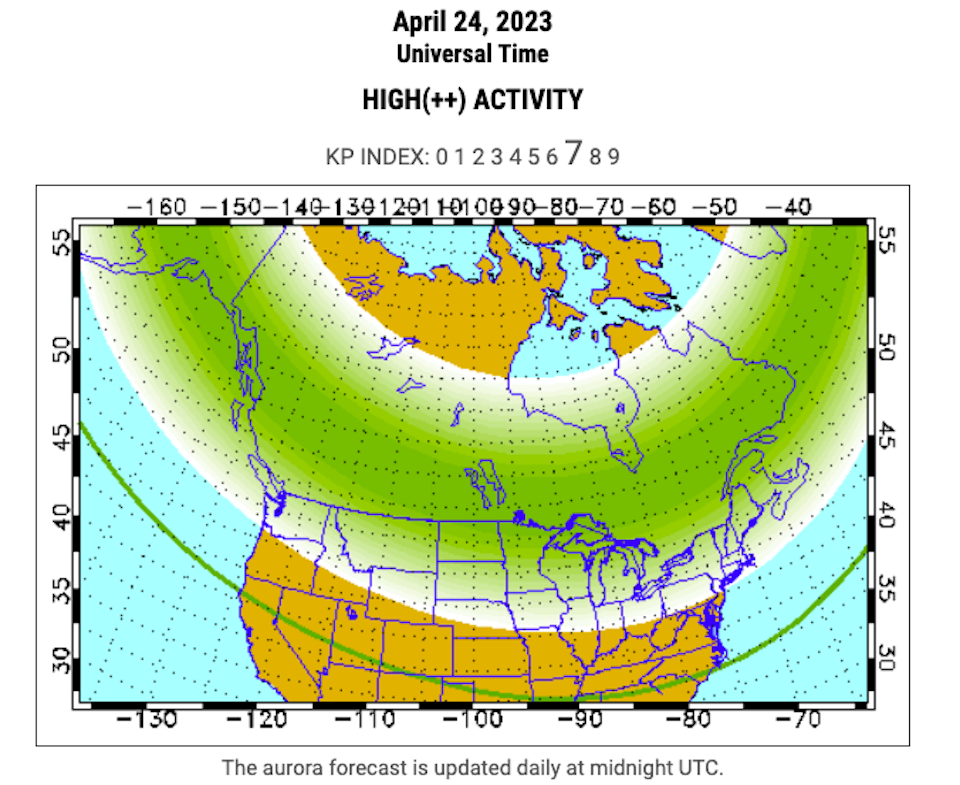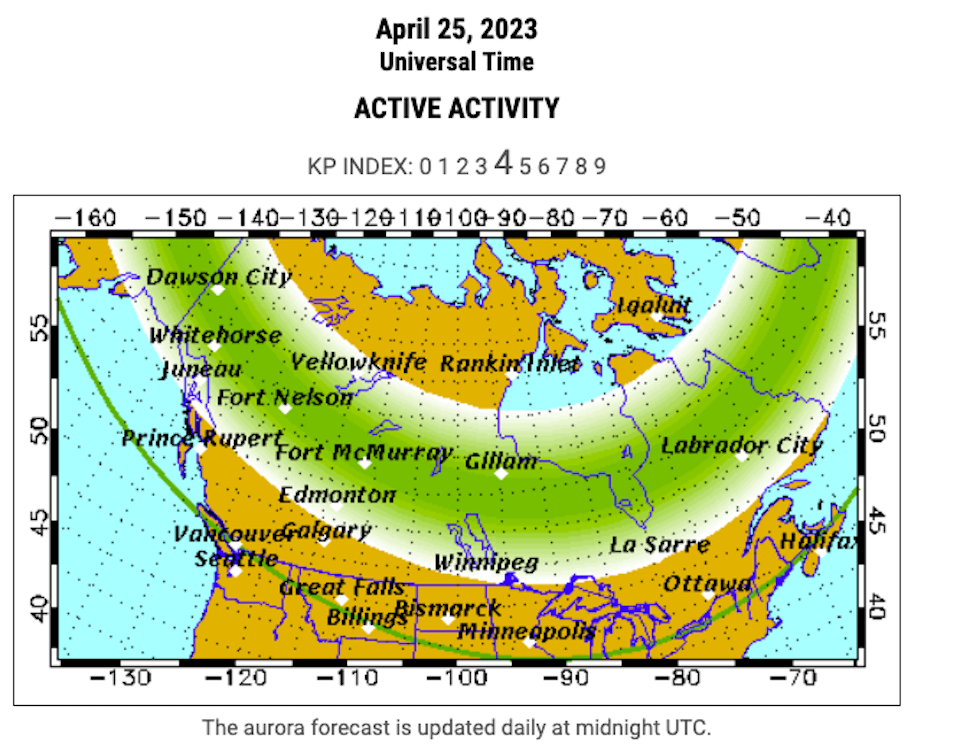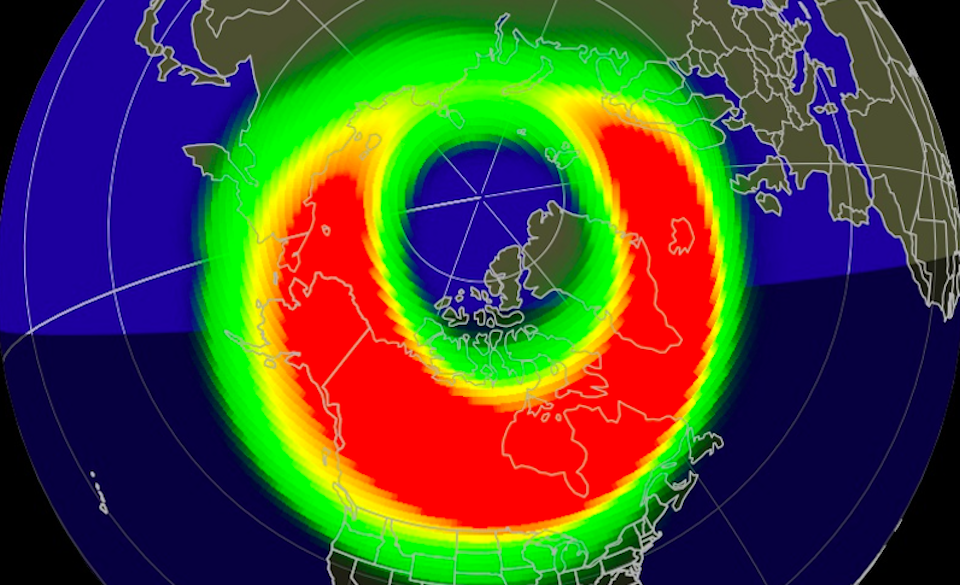A widespread area of North America, including several Canadian provinces and American states, were treated to awe-inspiring northern lights displays over the weekend.
And while Vancouverites were rain-robbed of the celestial treat, stormy space weather this week may provide a local viewing opportunity for patient sky-watchers.
On Sunday, April 23, the National Oceanic and Atmospheric Administration (NOAA)'s Space Weather Prediction Center observed a G4 "severe" geomagnetic storm, which resulted in the vibrant aurora borealis displays.
While NOAA had issued a G1 geomagnetic storm warning for Saturday and a G1 warning for Sunday, it notes that Sunday's storm "arrived earlier and was stronger than expected," making aurora viewing opportunities possible as "far south as Alabama and northern California."
Upwards of 30 U.S. states were treated to a colourful manifestation in the heavens, including ones that rarely see the aurora borealis, such as California and Texas.
(UPDATED) TONIGHT'S AURORA FORECAST:
— Space Weather Watch (@spacewxwatch) April 23, 2023
Based on current data, we've moved our possible Northern Lights viewing farther south. A moderate, strong, or severe geomagnetic storm is possible.
Aurora viewing is likely in the United States tonight as Earth is impacted by a strong solar… pic.twitter.com/rwyY9hvHDt
Multiple Canadian provinces, such as Alberta, Saskatchewan, and Ontario, were treated to stunning solar displays.
Took awhile for the clouds to break but managed to get a good show near Kindersley #Saskatchewan #northernlights #aurora #suzuki pic.twitter.com/S7TEBhkznB
— Jenny Hagan LostInSk (@LostInSk) April 24, 2023
Still can't believe what I witnessed over downtown Calgary last night! #yyc #auroraborealis #northernlights pic.twitter.com/kuNwQcVmqi
— Kyle Brittain (@KyleBrittainWX) April 24, 2023
That was...... life changing. #AuroraBorealis from Parkhill, Ontario@TamithaSkov @spacewxwatch pic.twitter.com/RrKv45RkH4
— Alex Masse (@CAlexMasse) April 24, 2023
The Metro Vancouver northern lights forecast is dependent on Vancouver weather
While rain prevented Vancouverites from viewing the northern lights Sunday, there are a couple of other viewing opportunities this week, although they won't parallel the jaw-dropping displays witnessed on the weekend.
According to the University of Alaska Fairbanks (UAF), the auroral activity is expected to be high on Monday with displays possible "overhead from Inuvik, Yellowknife, Rankin and Iqaluit, to Portland OR, Cheyenne, Lincoln, Springfield, and New York City, and visible low on the horizon as far south as Carson City, Oklahoma City, and Raleigh."
Unfortunately, the Metro Vancouver weather forecast includes the potential for cloudy skies and drizzle overnight Monday, which means the skies would need to clear for viewing to be possible.
The university's online aurora monitor map shows what regions the aurora's green glow will likely reach, as well as other areas where there is less of a possibility. Additionally, there is a brief description below the map of the aurora activity on that particular day. You can switch to other days to see the forecast, too.

There is another viewing opportunity overnight Tuesday, as the UAF is calling for "active auroral displays" possible overhead from places like Inuvik and Edmonton and "visible low on the horizon from Vancouver, Great Falls, Pierre, Madison, Lansing, Ottawa, Portland and St. Johns."
Environment Canada is also calling for clear skies overnight Tuesday in Metro Vancouver, providing more ideal conditions for catching the colourful display.

Light pollution in large cities makes the aurora borealis difficult to observe, but not impossible, given the right circumstances. But your best bet for viewing that hypnotic green glow is up north or outside of the city.
Of course, when you do spot the northern lights, they likely won't appear green or any other colour. Instead, you'll see the arcing, milky manifestation moving in the sky. In order to capture that green glow, you'll need to use a camera with a longer exposure.
Find out more northern lights information and viewing tips with our comprehensive guide.



